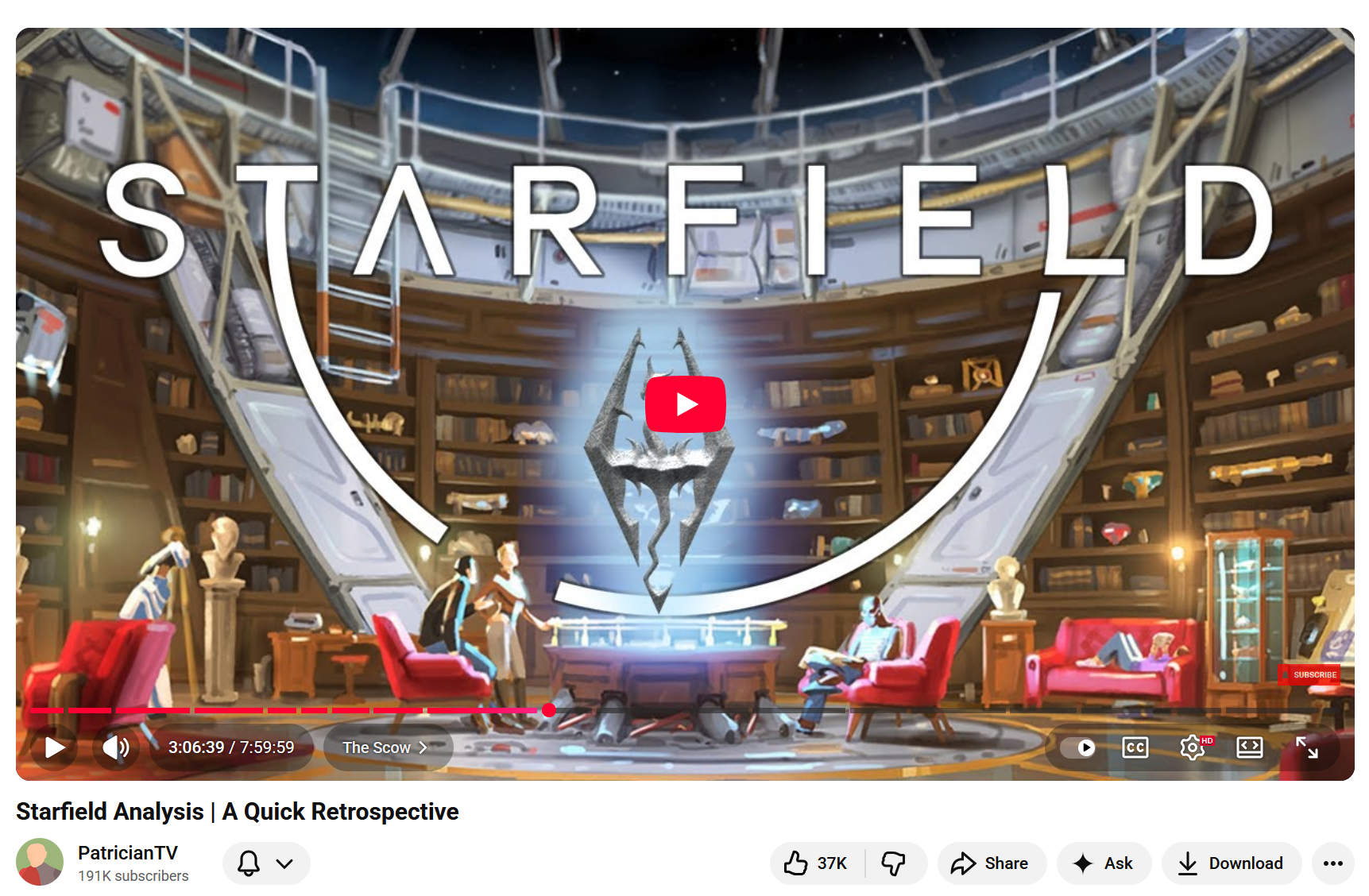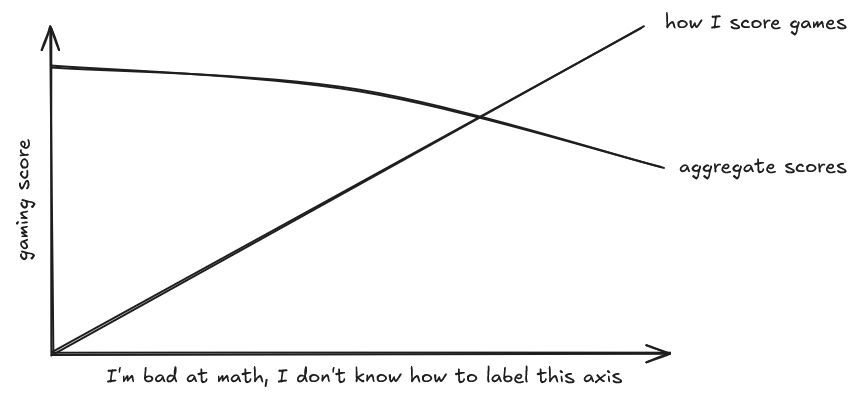Becoming a game critic who doesn't play games
Starfield is a big AAA game I have lots of opinions about - I don’t appreciate the lifeless NPCs, and I despise the faction design. I find the worlds barren and the plot lazy. And ugh, the loading screens. The loading screens everywhere. Why the hell do I have to wait through six loading screens to talk to a shopkeeper? Your game sucks, Bethesda!
Oh, one more thing: I’ve never played Starfield.
 Starfield: a game many of my favorite reviewers bashed. So I have too.
Starfield: a game many of my favorite reviewers bashed. So I have too.
I’ve read reviews and essays. I’ve watched over a dozen hours of video critiques - those sprawling, eight-hour deep dives that dissect every system and narrative choice. So here I am, holding really strong opinions about a game I haven’t even touched.
That’s ridiculous, isn’t it?
Yet I have troves of opinions about Anthem, Concord, Suicide Squad, Redfall. I know their stories, their mechanics, their broken promises. I’ve never launched any of them.
I have built, in my head, an entire phantom library - games I will never play but about which I hold elaborate, confident opinions.
The parasocial gamer
After I became a dad, I had less and less time for games. But I do have time for gaming media - it’s less demanding of my time and attention. I can listen to a game analysis video while doing dishes. I can scroll through reviews during nap time. I can keep up with industry news while my infant destroys the living room.
I subscribe to print magazines, follow my favorite reviewers, listen to retrospectives. I write about games, too, since March of this year I published 36 essays on gaming. This is a 37th weekly essay. At this point I spend more time engaging with the meta aspects of my hobby than the hobby itself.
And somewhere along the way, I stopped being a first hand gamer. I became a consumer of gaming discourse.
I’ve formed what can only be described as a parasocial relationship with games themselves. Just as people feel they “know” streamers they’ve never met, I have intimate relationships with games I’ve never played. I’ve spent more time with discourse about Starfield than some people spent playing Starfield.
The math is absurd. Let’s say I’ve consumed:
- 20 hours of video essays
- 3 hours of reviews
- 2 hours of Reddit threads
That’s 25 hours - almost the same time it takes to complete Starfield’s main story. But I chose the meta-experience over the primary one. Why?
 Nothing to see here, just an 8 hour critique of Starfield, a game I have not played. I’ve listened to the whole critique, though.
Nothing to see here, just an 8 hour critique of Starfield, a game I have not played. I’ve listened to the whole critique, though.
Partly it’s risk aversion - what if I spend $70 and 25 hours only to hate it? Partly it’s convenience - I can watch videos during baby naps, but I can’t dedicate focused gaming time. Partly it’s social currency - it’s easier to discuss shared critical discourse than personal experience. Look: I say “Starfield is lazy”, and we’ve already built up shared context.
And if I’m honest, it’s because the negative discourse is more satisfying than anything these games could actually bring to the table. I’m ashamed to admit how much I enjoy the drama.
Gaming media as a medium
Here’s my thesis: consuming media about games is its own medium, entirely separate from gaming itself.
Video essays aren’t just about games - they’re their own thing. Three-hour analytical deep dives with custom editing, fitting music, narrative framing. They’re closer to documentary films than game reviews. When I watch a Joseph Anderson breakdown, or a Noah Caldwell-Gervais retrospective, or a Patrician ramble, I’m not learning about a game - I’m experiencing a different creative work that uses the game as raw material.
Game criticism is entertainment, and I’m consuming it like any other media. You get to play the game, read the reviews and analyses, discuss those, and finally, engage with memes. I just happen to skip the first step for many games these days. It’s a hobby in it’s own right.
For someone who loves video games, there’s a lot of value in being able to gain shared context about games, and other hobbies have similar need for context. You know Shakespeare, although you probably haven’t read through the works - or if you have - you’ve long forgotten those. I hear Citizen Kane is an incredible piece of cinema, and I’m familiar with the synopsis - but I haven’t watched it.
Why should gaming be different?
The problem with this
Can I call myself a “gamer” if I don’t game? Are my opinions valid? What does it mean that I have strong feelings about experiences I haven’t had?
A couple of years ago, I built a spreadsheet documenting games I’d actually played and my personal scores. Then I compared them to Metacritic aggregate scores:
 When the industry scores games highly, I tend to really dislike them. And when the reviewers are unhappy, I find some of my personal favorites.
When the industry scores games highly, I tend to really dislike them. And when the reviewers are unhappy, I find some of my personal favorites.
On average, I disliked universally loved games and I truly loved games with middling aggregate scores. The correlation was inverse: my taste runs counter to the consensus.
I loved critical darlings like The Witcher 3, Baldur’s Gate 3, and other third installments in the series, sure. But I also loved games that critics dismissed. And I bounced hard off supposed masterpieces.
One of my favorite films is the 2005 Constantine with Keanu Reeves - 46% on Rotten Tomatoes. I know it’s not a good film, by any stretch of the definition. I love it anyway, probably because Keanu Reeves is badass and the vibes hit the spot.
But here’s the thing: the average family has 2.5 kids and doesn’t exist. An aggregate score represents the average gamer - who also doesn’t exist. Why should I trust that number, or any other reviewer consensus, over my own taste?
Yet by keeping up with gaming media, I rob myself of discovering titles I’d truly connect with. I’ve pre-formed opinions based on consensus. I’ve written off Vampire the Masquerade: Bloodlines 2 because my favorite reviewers called it a disappointing sequel to a flawed masterpiece. I’ll probably never play it.
I already made up my mind, and I don’t even have to experience the game anymore.
I could implement blackout periods - avoid media for certain games - but it’s hard to know what interests me without reading what others say. And even if I don’t click the headline “Bloodlines 2 is a disappointing sequel,” I already get the gist. My mind’s made up
What this means
I wonder if this is a glimpse of the future for those of us interested in games.
My capacity to play only shrinks as I choose to spend time on real-life stuff - like playing with my child, advancing my career, maintaining relationships. Meanwhile, more games release every year. The gap between what exists and what I can experience widens.
Maybe we’re entering an era where people interested in gaming culture will experience most games secondhand. Where the primary relationship is with criticism and discourse, not with games themselves.
Where the phantom library becomes the norm.
Maybe that’s fine. Maybe gaming media - video essays, retrospectives, critiques - has matured into its own legitimate form of entertainment. Maybe I’m not a failed gamer; I’m just consuming a different medium that happens to be adjacent to games.
Or maybe I’m just making excuses for the fact that I’ve become the kind of person who has loud opinions about things I haven’t experienced. Come to think of it, my opinions might actually be purer this way - uncontaminated by the messy subjectivity of playing the game with all its bugs and warts. Maybe I should start reviewing games solely based on reading other reviews. Although I’m pretty sure there’s a game critic somewhere who got caught doing exactly that.
I think about this often - how parenting reshapes not just what I do, but who I am in relationship to my hobbies (see rediscovering gaming as a new parent and gaming identity, parenting, and handhelds).
But this particular realization is weird: I’ve become a critic who doesn’t play games, sort of like a food critic who only browses the menus and synthesizes other reviews. And I’m not entirely sure how I feel about that.
Comments
Respond directly on Bluesky (threads shown below) or Medium (view comments there).
 Rooslawn's Unmapped Worlds
Rooslawn's Unmapped Worlds